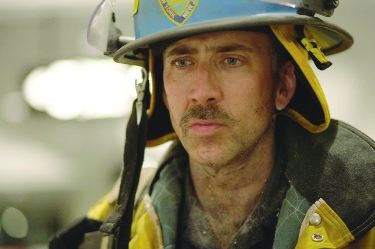Heroes

When it was announced that Oliver Stone would be directing a film about the downing of the twin towers on 9/11, there was a collective gasp. Would Stone focus on one of the many conspiracy theories about the disaster, as he did in JFK? Would he transform the story into a mythical tale of good versus evil, as in Platoon? Would he pull out all the stops and dwell on the death, destruction and violence, à la Natural Born Killers?
To everyone’s surprise, and many critics’ relief, Stone, working with a script by former actress and first-time screenwriter Andrea Berloff, has made a film that is not the least bit controversial.
It is also not the least bit interesting. It is a stolid, big-budget Movie of the Week that looks and feels as if it was constructed from an LCD (least-common-denominator) screenwriting textbook.
World Trade Center is a celebration of heroism and camaraderie, focusing on two members of New York’s Port Authority Police Department. Sergeant John McLoughlin (Nicolas Cage) and Officer Will Jimeno (Michael Peña) were seriously injured in the collapse of the towers and waited 12 hours to be rescued by men who were every bit as brave and selfless as the two police officers, since they were risking their own lives too in the effort.
As an inspirational tale of how much good was displayed on a day that will always be remembered for so much evil, World Trade Center has its heart in the right place. It tries to do for 9/11 what Frank Capra did for the Great Depression and William Wyler did for World War II. The difference is that when Capra and Wyler rallied the nation during times of trauma, they didn’t abandon their directing skills.
Not once did I find myself in awe of a shot, a camera angle, a lighting position or even pieces of the soundtrack. If I didn’t know entering the theater that the film was by Stone, I would have guessed it was the work of an eager youngster. One of the admirable aspects of Stone has been his willingness to fail on his own terms. Not here.
He isn’t helped much by Berloff’s script. (Stone, who began his film career as a writer, usually produces his own screenplays.) The character introductions are strictly by the book, the exposition is clumsy and obvious, and the dialogue among the police officers to set the tone is like the foxhole dialogue that was a regular feature of the old war movies in which every ethnic group was represented.
This predictability extends to the portrayal of the families waiting for news of loved ones. The scenes with Donna McLoughlin (Maria Bello) in New York and Allison Jimeno (Maggie Gyllenhaal) in New Jersey are so familiar they could have been outtakes from Apollo 13.
I like the way Stone avoided shots of the planes hitting the towers, showing instead shadows against the walls of buildings, quick flashes of television sets and a plethora of horrified reaction shots.
At a few moments it begins to look like Stone will strut his stuff, especially when he deals with the story of Dave Karnes (Michael Shannon), an ex-marine from Connecticut who plays a key part in the search for the two police officers. Karnes’s role seems to be Stone’s pathway into the story, but Karnes gets lost in a jumble of backlighting and off-screen shouting.
The acting is tepid at best. Cage’s one-note expression looks painted on. Peña (who was so strong as the locksmith in last year’s Crash) fares the best, underplaying while those around him go over the top.
The word around Hollywood is that the financial failure of Alexander prompted Stone to be cautious. He wanted to make a film that would be in line for Oscar nominations and guarantee big DVD sales. That may all come to pass. But what does a director profit if he gains major domestic and overseas grosses and loses his own soul?




